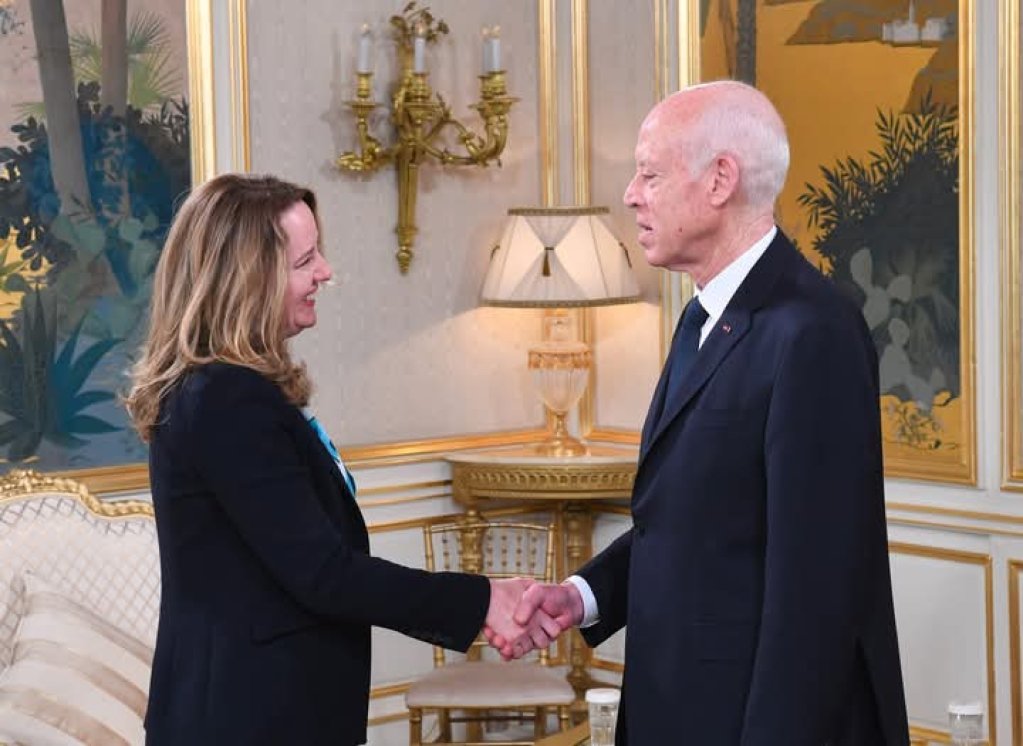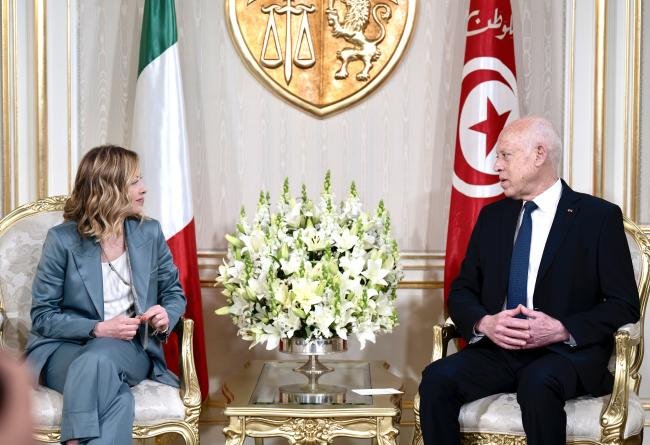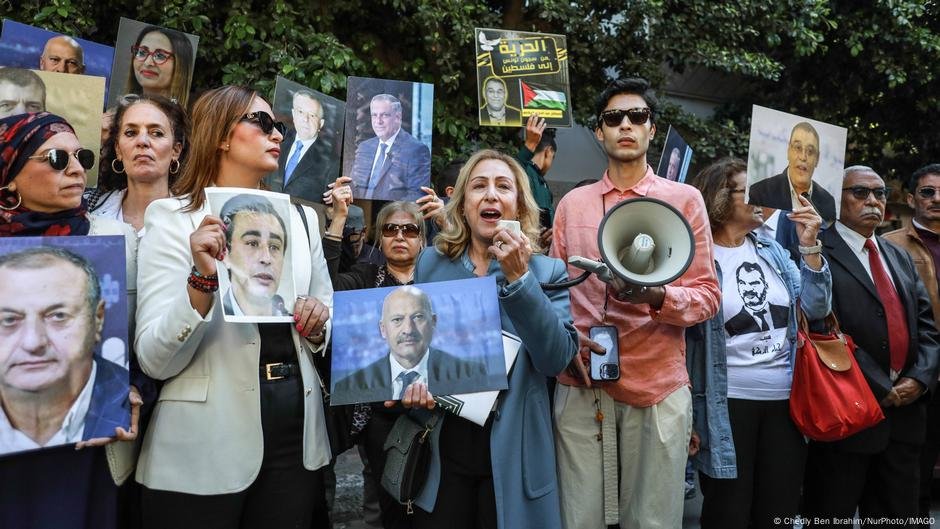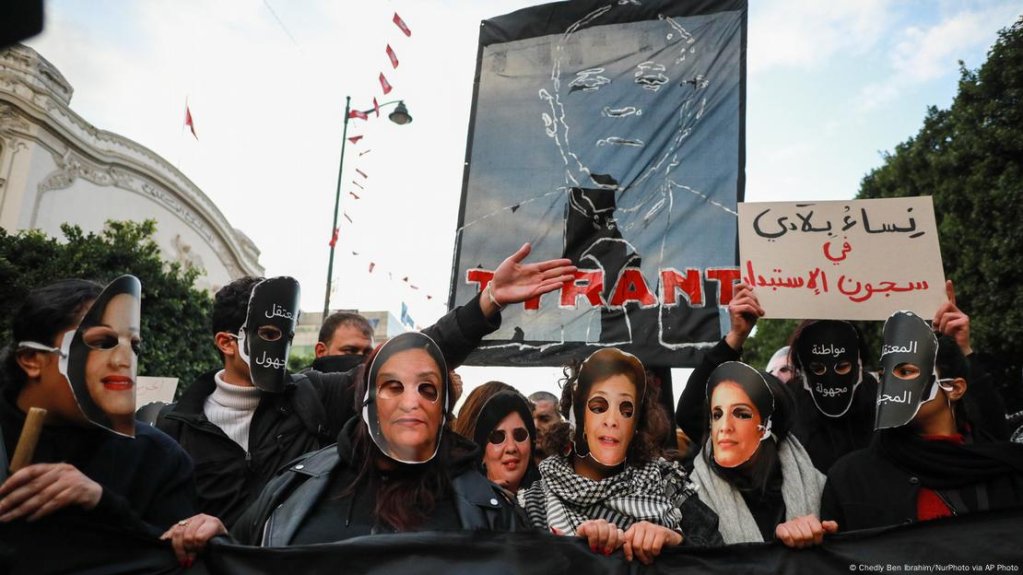At least 40 migrants from sub-Saharan Africa, including women and infants, drowned off Tunisia’s coast. While rights groups warn of mounting repression and the growing dangers faced by migrants seeking safety in Europe.
At least 40 migrants from sub-Saharan Africa, including women and infants, drowned when their boat sank off Tunisia’s coast early Wednesday (October 23), authorities said -- one of the deadliest maritime tragedies in the region this year.
Another 30 survivors were rescued by the Tunisian coastguard after the vessel was discovered at dawn near the Sleqta area, south of Tunis, according to the state TAP news agency.
"Initial investigations indicate there were around 70 people on board," said Walid Chtabri, spokesperson for the public prosecutor’s office in Mahdia. "Forty bodies, including infants, were recovered, and 30 people were rescued. They were all from countries in sub-Saharan Africa."
The cause of the shipwreck remains unclear, and investigators are working to determine when the boat went down and from which part of the coast it had departed.
Tunisia, located just 145 kilometers from the Italian island of Lampedusa, has become a key transit point for thousands of African migrants and refugees fleeing conflict and poverty, in search of safety and opportunity in Europe.
A deadly route and a growing crackdown
The Central Mediterranean route -- connecting North Africa to Italy -- is the world's deadliest migration corridor, according to the International Organization for Migration (IOM). Since 2014, more than 32,000 people have died or gone missing attempting the crossing.
But Tunisia’s role as a launching point has increasingly come under scrutiny amid mounting evidence of abuses against migrants and democratic backsliding at home.

A recent shadow report by Human Rights Watch (HRW) submitted to the African Commission on Human and Peoples' Rights accuses Tunisian authorities of arbitrary arrests, beatings, and collective expulsions of Black African migrants and asylum seekers -- including forced transfers to desert border zones with Libya and Algeria, where several people reportedly died.
The report describes "racialized policing" and "dangerous conduct at sea" by Tunisian security forces, as well as the denial of basic protection and access to asylum procedures.
Read Also'We're afraid the police will return': Two migrants stranded in Tunisia tell of their ordeal
Tunisia’s authoritarian drift
Once hailed as the Arab Spring’s sole democratic success, according to human rights organizations, Tunisia is sliding rapidly into authoritarian rule under President Kais Saied, a former constitutional law professor elected in 2019 on a populist anti-corruption platform.
Since suspending parliament in 2021, Saied has dismantled the checks and balances that once defined Tunisia’s post-revolution democracy. He has replaced independent institutions, undermined the judiciary, and jailed dozens of political opponents, journalists, and activists on charges of "conspiracy," "spreading false information," or "undermining state security."

The HRW shadow report documents systematic patterns of arbitrary detention, preventive detention without judicial safeguards, and military trials for civilians -- including opposition figures, lawyers, and human rights defenders.
HRW found that as of January 2025, more than 50 Tunisians were detained on political grounds, while courts continued to issue death sentences, despite a de facto moratorium placed on executions since 1991. The organization said these practices have had "a chilling effect on freedom of expression, association, and assembly."
"Since President Saied granted himself extraordinary powers in 2021, Tunisia has seen a collapse in judicial independence and a surge in arbitrary arrests," the report details. "Security forces continue to target critics, journalists, and civil society actors with intimidation and prosecution."
Read AlsoTunisia seeks more funding from IOM for voluntary repatriations
Migrants caught in the crackdown
The shadow report devotes particular attention to abuses against Black African migrants, refugees, and asylum seekers -- describing what HRW calls "racialized policing" and collective expulsions that often violate the principle of non-refoulement.
Following inflammatory remarks made by President Saied in February 2023, accusing sub-Saharan migrants of "plotting to change Tunisia’s demographic composition," there was a wave of racist attacks, arbitrary arrests, and forced evictions against Black Africans in the country.
Tunisian authorities subsequently expelled hundreds of Black African migrants -- including women, children, and registered asylum seekers -- to desert areas along the Libyan and Algerian borders, where many were left without food or water. HRW reports that several people died and that survivors described sexual violence, beatings, and theft at the hands of Tunisian and Libyan security forces.
"These collective expulsions have become virtually systematic after interceptions at sea," the report warns, calling for accountability and oversight of the police, coast guard, and military.

Despite these concerns, Tunisia remains a key partner in the European Union’s migration deterrence policy. In 2023, the EU signed a 255 million euros deal with Saied’s government -- nearly half of which was designated to strengthen Tunisia's border control and anti-smuggling capacity.
The deal, championed by Italy’s right-wing government, was meant to prevent boats from leaving Tunisia’s coast, but rights groups say it has instead trapped thousands of migrants in an increasingly hostile environment, while externalizing Europe’s border enforcement to a government accused of rights abuses.
Read AlsoEU presents blueprint for new pact for the Mediterranean to address causes of migration
Civil society under siege
HRW’s report paints a bleak picture of Tunisia’s civic space. Authorities have intensified pressure on NGOs through administrative obstacles, asset freezes, and arbitrary prosecutions -- particularly targeting groups working on migration, racial justice, and human rights.
Between May and August 2024, security forces arrested at least six members of legally registered NGOs, including Mnemty, the Tunisian Refugee Council, and Terre d’Asile Tunisie. They were accused of receiving foreign funds to "encourage irregular migration."

Their ongoing trial in Tunis has become a symbol of the shrinking space for civil society. Activists and journalists have also faced prosecution under Decree-Law 54 on Cybercrime, a sweeping 2022 law used to criminalize online speech critical of the president or government institutions.
"The government is not only targeting migrants, but also those who help them," said a Tunis-based lawyer representing one of the NGO workers. "It’s part of a larger pattern of silencing dissent and dismantling rights protection."
Read AlsoAid workers who support migrants on trial in Italy and Tunisia
Eroding freedoms and gender inequality
The HRW report also notes that Tunisia's freedom of expression, association, and assembly -- once among the most vibrant in the Arab world -- has been severely curtailed. Military courts have tried civilians, including journalists and opposition members, for "insulting" the army.
Women’s rights, once a point of national pride, are also regressing. HRW highlights the government’s failure to fully implement Law No. 58 (2017) on the Elimination of Violence Against Women, noting persistent police inaction, limited funding for shelters, and the 2022 abolition of gender parity in electoral law, which may drastically reduce female representation in parliament.
For survivors of the recent shipwrecks, the dangers of the sea are only the beginning of a long ordeal. Many face detention, discrimination, or deportation in Tunisia, or uncertain futures in reception centers in Italy.
Read Also'Train migrants before departures' – Italian Interior Minister
With AFP, dpa and Reuters.
